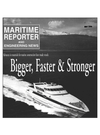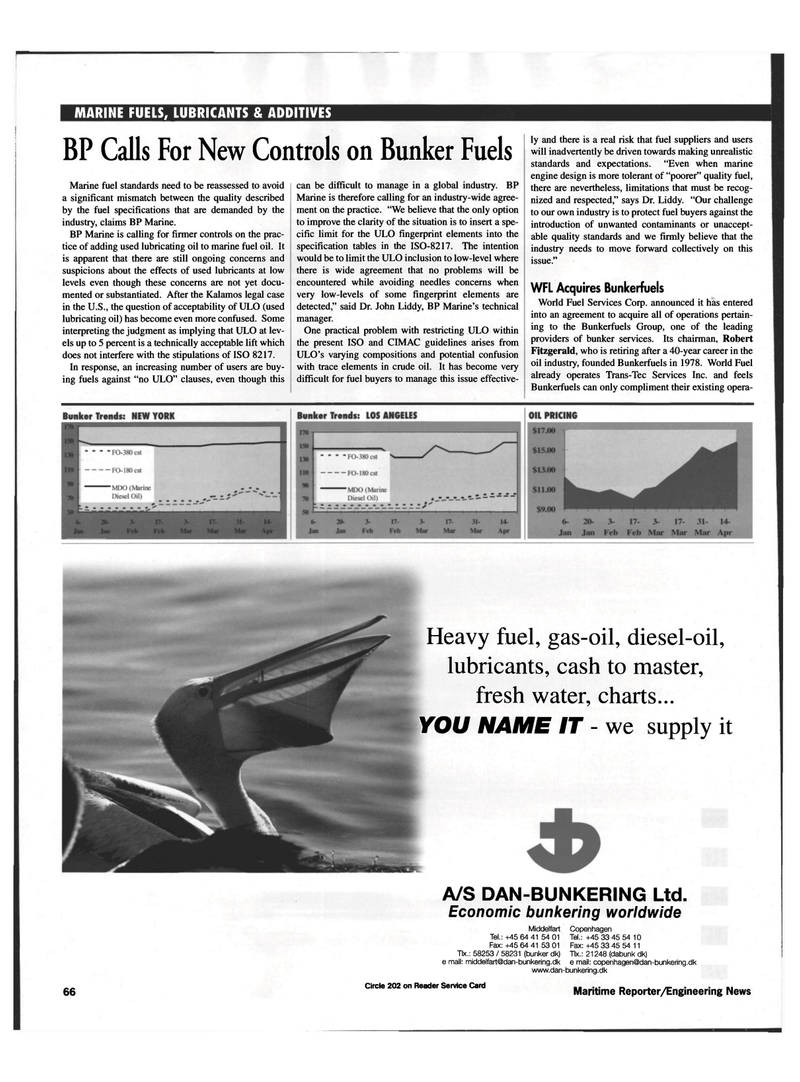
Page 64: of Maritime Reporter Magazine (May 1999)
Read this page in Pdf, Flash or Html5 edition of May 1999 Maritime Reporter Magazine
MARINE FUELS, LUBRICANTS & ADDITIVES
BP Calls For New Controls on Bunker Fuels
Marine fuel standards need to be reassessed to avoid a significant mismatch between the quality described by the fuel specifications that are demanded by the industry, claims BP Marine.
BP Marine is calling for firmer controls on the prac- tice of adding used lubricating oil to marine fuel oil. It is apparent that there are still ongoing concerns and suspicions about the effects of used lubricants at low levels even though these concerns are not yet docu- mented or substantiated. After the Kalamos legal case in the U.S., the question of acceptability of ULO (used lubricating oil) has become even more confused. Some interpreting the judgment as implying that ULO at lev- els up to 5 percent is a technically acceptable lift which does not interfere with the stipulations of ISO 8217.
In response, an increasing number of users are buy- ing fuels against "no ULO" clauses, even though this can be difficult to manage in a global industry. BP
Marine is therefore calling for an industry-wide agree- ment on the practice. "We believe that the only option to improve the clarity of the situation is to insert a spe- cific limit for the ULO fingerprint elements into the specification tables in the ISO-8217. The intention would be to limit the ULO inclusion to low-level where there is wide agreement that no problems will be encountered while avoiding needles concerns when very low-levels of some fingerprint elements are detected," said Dr. John Liddy, BP Marine's technical manager.
One practical problem with restricting ULO within the present ISO and CIMAC guidelines arises from
ULO's varying compositions and potential confusion with trace elements in crude oil. It has become very difficult for fuel buyers to manage this issue effective- ly and there is a real risk that fuel suppliers and users will inadvertently be driven towards making unrealistic standards and expectations. "Even when marine engine design is more tolerant of "poorer" quality fuel, there are nevertheless, limitations that must be recog- nized and respected," says Dr. Liddy. "Our challenge to our own industry is to protect fuel buyers against the introduction of unwanted contaminants or unaccept- able quality standards and we firmly believe that the industry needs to move forward collectively on this issue."
WFL Acquires Bunkerfuels
World Fuel Services Corp. announced it has entered into an agreement to acquire all of operations pertain- ing to the Bunkerfuels Group, one of the leading providers of bunker services. Its chairman, Robert
Fitzgerald, who is retiring after a 40-year career in the oil industry, founded Bunkerfuels in 1978. World Fuel already operates Trans-Tec Services Inc. and feels
Bunkerfuels can only compliment their existing opera-
Heavy fuel, gas-oil, diesel-oil, lubricants, cash to master, fresh water, charts...
YOU NAME IT - we supply it
A/S DAN-BUNKERING Ltd.
Economic bunkering worldwide
Middelfart Copenhagen
Tel.: +45 64 41 54 01 Tel.: +45 33 45 54 10
Fax: +45 64 41 53 01 Fax: +45 33 45 54 11
Tlx.: 58253 / 58231 (bunker dk) Tlx.: 21248 (dabunk dk) e mail: [email protected] e mail: [email protected] www.dan-bunkering.dk 66 Circle 202 on Reader Service Card Maritime Reporter/Engineering News

 63
63

 65
65
